North West Blood Bikes celebrates ten years of saving lives – and NHS cash - in Lancashire
and live on Freeview channel 276
The first North West Blood Bikes volunteer started his shift just like the hundreds of others who have followed in his tail wind in the decade since - poised to pick up the phone, collect a potentially life-saving cargo and transport it from one hospital to another in double quick time.
There was just one problem on that inaugural night back in May 2012 - the calls never came.
Advertisement
Hide AdAdvertisement
Hide Ad“The first guy on duty stayed up in his bike leathers all night, but was never contacted,” recalls one of the charity’s founders, Paul Brooks.
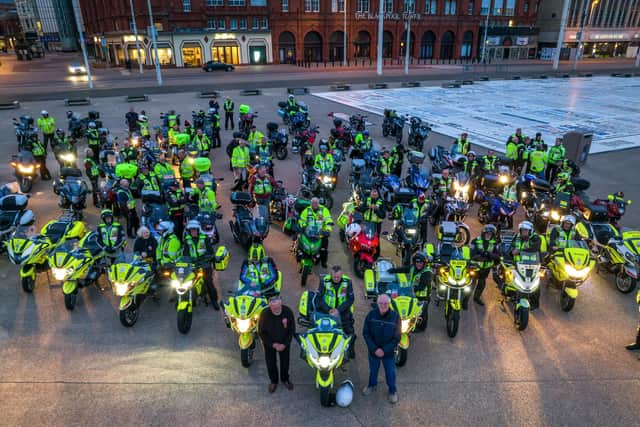

The former Lancashire Police officer - who had spent 28 years in the force’s traffic division - was a keen biker, but knew nothing of the Blood Bikes concept, even though it was already operating in other parts of the country.
When he learned of it in retirement, Paul was keen to help Lancashire benefit from a set-up which sees volunteer bike-riders called upon by the NHS to ferry essentials such as blood, breast milk and surgical instruments to wherever they may be needed.
In those early days, that usually meant travelling between the Royal Preston and Chorley and South Ribble Hospital - the two facilities operated by Lancashire Teaching Hospitals (LTH), the NHS trust to which the embryonic charity first offered its support.
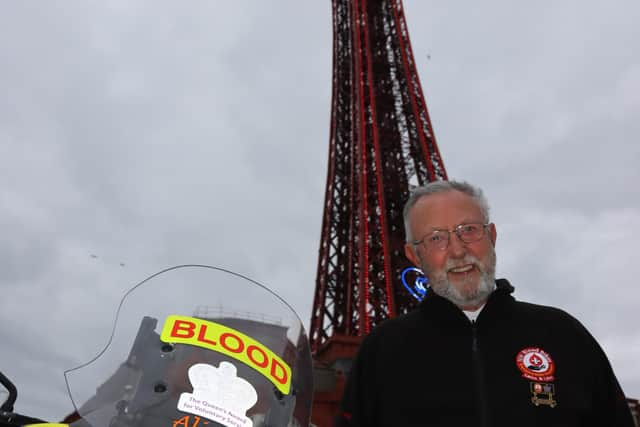

Advertisement
Hide AdAdvertisement
Hide AdIt is fair to say that demand for the Blood Bikes service - and the distances travelled by its now 300-strong army of riders - have ballooned over the past ten years. Memories of shifts with no calls are now distant visions in the wing mirrors.
As the charity celebrated its milestone anniversary beneath a Blackpool Tower lit red in its honour on Thursday night, it was on the cusp of clocking up its 112,000th delivery.
Now serving hospital trusts across Lancashire and South Cumbria - and facilities including Blackpool Victoria Hospital, Furness General, the Royal Lancaster Infirmary, the Royal Blackburn and Southport and Ormskirk hospitals - the organisation makes an average of 1,300 drop-offs per month.
Paul, who chaired the charity for the first seven years of its operation, told the Local Democracy Reporting Service that a “conservative estimate” indicates that North West Blood Bikes (Lancashire and Lakes) has saved the NHS £6.5m in transport costs over the last decade.
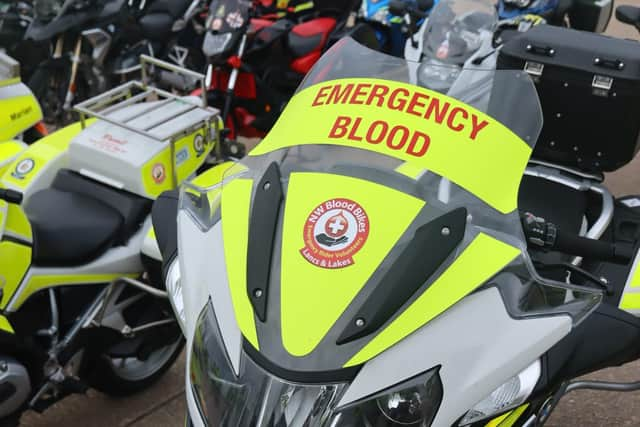

“That’s money that can be spent on patients or equipment.
Advertisement
Hide AdAdvertisement
Hide Ad"It's beyond our wildest dreams - when we started, we really didn't expect it to be as successful as it has become. But now we have travelled the equivalent of the distance to the moon and back about five times,” says Paul who established the charity with former Lancashire paramedic Graham Jones, who had already been toying with idea of setting up a Blood Bikes service in Lancashire when Paul, too, began to look into the idea.
Based in Bamber Bridge, the service operates out of hours - between 6pm and 2am on weekdays and around the clock at weekends and bank holidays - when the NHS’s own transport services would usually be unavailable and hospitals would have to rely on expensive taxis.
“I think the fact that we are free is an incentive for them to use us,” laughs the Blood Bikes current chair, Mark Entwistle, who lives in Blackpool.
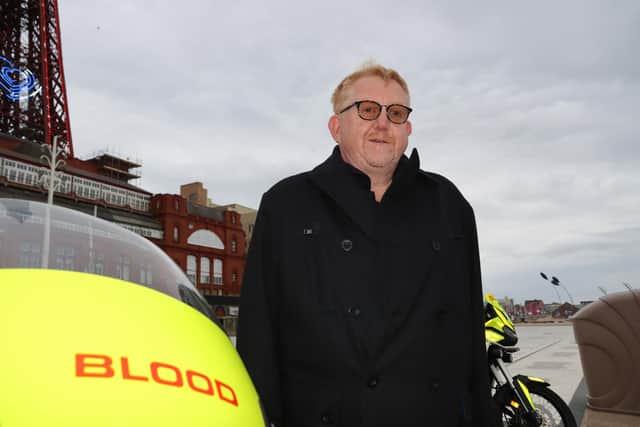

“But we have to do it properly - there are lots of rules around how you carry things, including [the need to maintain certain] temperatures.
Advertisement
Hide AdAdvertisement
Hide Ad“Every run is different; one could be five miles, but others - say from Barrow - could be an hour-and-a-half just one way.
“We carry anything that can go on a bike - apart from people. A lot of it is samples - and Covid has increased that - but also medication is taken between hospitals and also from hospitals to nursing homes.
“Then there are obviously the blood products and theatre instruments. A lot of hospitals in the same trust do share resources - so there is a lot of backwards and forwards between them, because they don’t always have everything on one site.
“We don't know the patients we’re carrying blood or equipment for, but it’s amazing how often when we are at an event somewhere - and we are out rattling our collection tins - that people do come over and say that we have delivered something for them or their family when they needed it,” Mark adds.
Advertisement
Hide AdAdvertisement
Hide AdHe is one of the Blood Bikes' 60 “controllers” - the operators who man the phones and dispatch the up to 15 riders who can be on the road during a single shift across the charity’s five divisions.
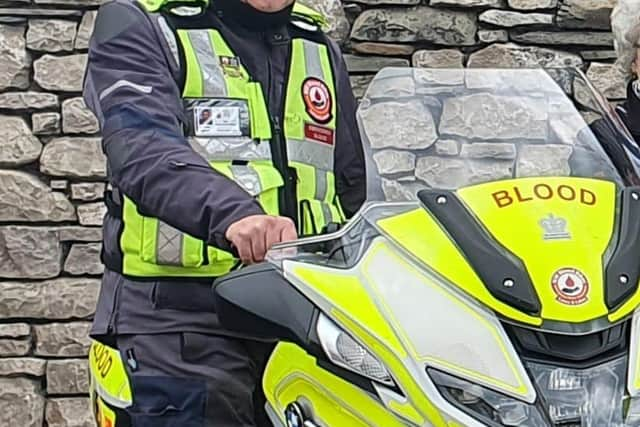

They also wait for the call to say that a rider is safely home - a now poigannt moment after the death of volunteer Russell Curwen, 49, in Lancaster in 2018.
John Walker, a rider in the Lancaster, Kendal and Barrow patch – and a charity committee member - says that most volunteers are drawn to the service because of their own experience of being cared for by the NHS and a desire “to give something back”.
“Over nine years ago, I got a severe bout of stress at work. It was so bad, I thought I was having a heart attack and they took me off to Blackpool Hospital for tests.
Advertisement
Hide AdAdvertisement
Hide Ad“When I was back in work, I saw a poster which said Blood Bikes were looking for riders - and I have been with them ever since.
“There’s nothing better than when there is a nurse waiting for you at the door to take something from you - especially if it's a kids ward.
“One night, I even had to transfer pagers to a hospital, because they need to have a set amount available - and if I hadn't taken them, they would have had to shut a particular unit that night.
“So you're doing something you really enjoy - riding your bike - and you have got the added bonus of helping people at the same time,” says John.
Advertisement
Hide AdAdvertisement
Hide AdThe charity hopes that others will now be tempted to join the volunteer transport service on which the NHS in Lancashire and South Cumbria has come to rely - either as riders, controllers, admin staff or fundraisers.
While it has a healthy 450 volunteers in total and no salaried workers, it nevertheless costs about £10,000 per month to keep the service on the road - and so every pound raised and hour donated is crucial.
Currently, about £1,500 of that monthly bill is spent on fuel, but just under half of it goes on regularly replacing the charity’s fleet of bikes - the mileage of which means they have a lifespan of only around two or three years.
Riders need to have an advanced qualification to climb aboard one of the Blood Bikes' own specially-equipped and liveried machines, but those without such qualification can use their own bikes - and also cars - if they still want to get involved.
Advertisement
Hide AdAdvertisement
Hide AdMark says that while such volunteers can claim fuel costs for using their own vehicles, most choose not to.
“It's supporting an organisation that’s under immense pressure. Sometimes it’s just nice to do something for nothing,” he says.
After ten years of riding to the rescue of a financially-strained NHS, Lancashire's hospitals would no doubt agree.
‘HERE’S TO THE HEROES’
Kevin McGee, chief executive at Lancashire Teaching Hospitals, said of the charity’s tenth anniversary: “We had the privilege of being the first trust in our region to work with North West Blood Bikes, and we would like to thank them for their ten years of dedicated service to the communities of Lancashire and South Cumbria.
Advertisement
Hide AdAdvertisement
Hide Ad“During the pandemic, the blood bikers became an even more essential part of our extended team, transporting COVID-19 test results and specialist equipment between different locations helping us to ensure that patients got the best possible care as quickly as possible. They are heroes who continue to help to save lives every day and we look forward to continuing to work with them in the years ahead.”
IN NUMBERS
£6.5m - amount North West Blood Bikes is estimated to have saved the NHS in Lancashire and South Cumbria since 2012.
£750K - annual amount the charity is now estimated to save the NHS in the region
112,000 - number of completed deliveries in the last deacde
45 percent - proportion of monthly costs which go on new bikes
22 percent - proportion of monthly costs spent on fuel
